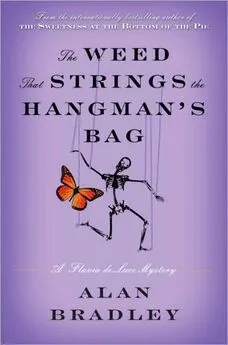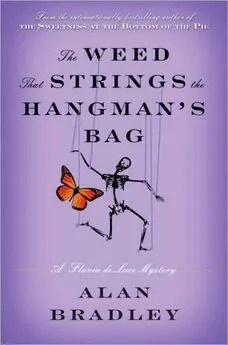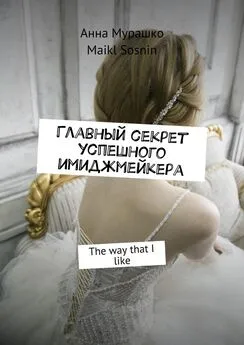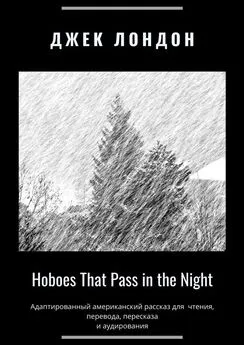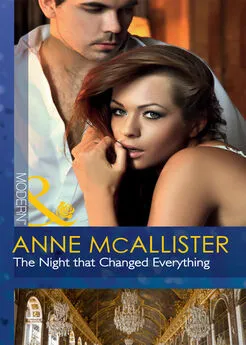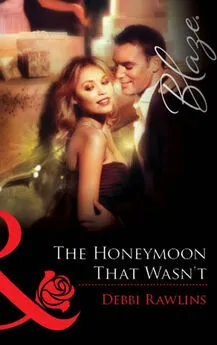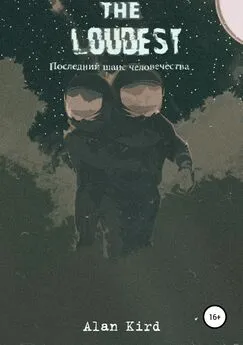Alan Bradley - The Weed That Strings the Hangman's Bag
- Название:The Weed That Strings the Hangman's Bag
- Автор:
- Жанр:
- Издательство:неизвестно
- Год:неизвестен
- ISBN:нет данных
- Рейтинг:
- Избранное:Добавить в избранное
-
Отзывы:
-
Ваша оценка:
Alan Bradley - The Weed That Strings the Hangman's Bag краткое содержание
The Weed That Strings the Hangman's Bag - читать онлайн бесплатно полную версию (весь текст целиком)
Интервал:
Закладка:
"Even when it leads to murder?" I asked, suddenly bold.
With her brush extended to arm's length, she painted in the dark shadow of a tree. "Even when it leads to murder."
We sat for a few moments in silence, Aunt Felicity dabbing away at her canvas with no particularly exciting results, and then she spoke again: "If you remember nothing else, remember this: Inspiration from outside one's self is like the heat in an oven. It makes passable Bath buns. But inspiration from within is like a volcano: It changes the face of the world."
I wanted to throw my arms around this dotty old bat in her George Bernard Shaw costume and hug her until the juices ran out. But I didn't. I couldn't.
I was a de Luce.
"Thank you, Aunt Felicity," I said, scrambling to my feet. "You're a brick."
* SEVENTEEN *
WE WERE AT TEA in the library. Mrs. Mullet had come in and gone out, leaving behind a vast tray of Jenny Lind cake and currant scones. To my whispered question about Nialla, she had replied with a shrug, and wrinkled her brow to remind me that she was on duty.
Feely was at the piano. It hadn't taken more than three minutes for Dieter to ask politely which of us played, and Feely had replied with her blushes. Now, sufficiently coaxed and implored, she was just beginning the second movement of Beethoven's Pathetique sonata.
It was a lovely piece and, as the music faded away and then welled up again, like longings in the heart, I remembered that it was the music Laurie Laurence had played in Little Women , as Jo, who had refused his proposal, walked away outside his window, and I wondered if Feely had chosen it subconsciously.
Father was dreamily tapping a forefinger against the edge of his saucer, which he held beautifully balanced in his hands. There were times when, for no apparent reason, I felt a huge tidal wave of love — or at least respect — for him, and this was one of them.
In the corner, Daffy was curled up like a cat in an armchair, still in the clutches of The Anatomy of Melancholy , and Aunt Felicity sat contentedly near the window, doing something intricate with a pair of needles and a ball of sulfur yellow wool.
Suddenly I noticed that Dieter was biting the corner of his lip, and there was a glistening at the corner of his eye. He was almost in tears, and trying not to show it.
How cruel it was of that witch, Feely, to choose something so sad and so evocative: a melody by Beethoven that could only serve as a bitter reminder to our German guest of the homeland he had left behind.
But at that instant, Feely broke off abruptly and leapt up from the keyboard.
"Oh!" she gasped, "I'm so sorry! I didn't mean to — "
And I could see that for probably the first time in her life, she was genuinely distressed. She flew to Dieter's side and held out her handkerchief — and to his eternal credit, he took it.
"No. It is I who should be sorry," he said, wiping at his eyes. "It's just that — "
"Dieter," I found my mouth suddenly blurting, "tell us how you came to be a prisoner of war. I've been simply dying to ask you. I'm frightfully keen on history, you know."
You could have heard a pin drop in Antarctica.
"Flavia!" Father finally managed — but only when it was far too late to have the effect that he intended.
But Dieter was already smiling. It seemed to me he was relieved to have got past the dampness.
"But of course!" he said. "For five years I have been waiting for someone to ask me — but no one ever has. You English are all such perfect gentlemen — even the ladies!"
Aunt Felicity shot him a look of beaming approval.
"But," Dieter added, "I must warn you — it's a long story. Are you sure you want to hear it?"
Daffy closed her book and set it aside. "I adore long stories," she said. "In fact, the longer, the better."
Dieter took up a stance on the rug in front of the fireplace, his elbow on the mantelpiece. You could almost picture him at a hunting lodge in the Black Forest.
"Well," he said, "I think you could safely say that I was shot down in England because of the Bronte sisters."
Shot down? This was something new! I was all agog.
Daffy's eyes were instantly like china doorknobs, and even Father sat up straight.
"Good Lord!" he muttered.
"I was spoiled, as a boy," Dieter began, "and I must admit to it. I was an only child, brought up in a well-to-do household by a Kinderpflegerin — a nursery governess.
"My father, as I have said, was a publisher, and my mother an archaeologist. Although they loved me well enough, I suppose, they were both so wrapped up in their own worlds that everything having to do with 'the boy' was left up to Drusilla. That was the governess's name — Drusilla.
"Drusilla was a very great reader of English novels. She consumed books like a whale eats krill. You never saw her without a book in her hand — in fact, she taught me to read while I was still sucking my thumb.
"Drusilla had read all of the Bronte sisters' books, of course: Wuthering Heights, Jane Eyre, Shirley, The Tenant of Wildfell Hall — she had them almost by heart.
"I was half in love with her, I think, and I thought that I could make her love me by reading aloud in English from her favorites.
"And that was how I became an Anglophile. From that time on, I wanted nothing more than to read English books: Dickens, of course, and Conan Doyle; Jane Austen and Thomas Hardy. When I was a bit older, Drusilla gave me for Christmas subscriptions to The Boy's Own Annual and Chums . By the time I was twelve, I was more British than many a boy from Brixton!
"Then came the wireless. From the articles in Chums , and with the help of a schoolboy friend who lived next door — his name was Wolfgang Zander — I was able to put together a simple single-valve wireless receiver with which we could tune in to the broadcasts of the BBC.
"We were mad about electrical gadgets, Wolfgang and I. The first thing we made was a battery-operated doorbell; the next was a telephone between my bedroom and his, with the wire strung over the rooftops and through the trees.
"Long after our families were asleep, that cotton-covered wire high in the branches buzzed long into the night with our feverish speculations. We would talk away the night, about wireless, of course, but also about English books, for Wolfgang, you see, also had been bitten by the English — and particularly the Bronte — bug.
"The adolescent imagination is a powerful force, and I suppose we saw ourselves, Wolfgang and I, as Knights of the Round Table who would come riding out from our Teutonic stronghold to rescue these Bronte sisters: these three fair, pale maidens — whose very names identify them as daughters of the Thunder-god — who were being held hostage by a monster in their cold stone tower in the north.
"Besides," he added, "there is something about young, helpless damsels in damp climates that makes every adolescent boy want to carry them off and marry them."
He paused to let his words have their effect, looking keenly from one of us to another, and as he did, I saw with a sudden shock that in Feely and Daffy and me, Dieter fancied he had found his Brontes; and in Buckshaw, his cold stone tower. We were his Charlotte, Emily, and Anne!
And there we sat, the three of us, our mouths hanging open like dogs.
My mind was reeling as Dieter went on: "But too soon we grow up," he said with a sigh. "Too soon we take on the joys of the grown-up world, but also its troubles.
"Always, there is an age when boys discover flying, and it came early to me. My parents enrolled me in the NSFK — the National Socialist Flying Corps — and when I was fourteen, I found myself suddenly alone at the controls of a Schulgleiter , soaring like a hawk high above the Wasserkuppe, in the hills of the Hessian Rhon.
"From the air, these mountains, even though they are of quite a different geology, bear in some places a startling resemblance to the moors of North Yorkshire."
"How do you know that?" Daffy interrupted.
"Daphne!" Father said. His pointed look added the word manners .
"Is it because you've bombed Sheffield?"
There was a shocked silence at her question. How bold she was! Even I would not have asked Dieter about his aerial activities over England, although I will admit that, just minutes before, that very point had crossed my mind.
"Because," Daffy added, "if you have, you must say so."
"I was coming to that," Dieter said quietly.
He continued without batting an eye.
"When the war came, and I was transferred to the Luftwaffe, I always kept the small English 'Everyman' editions of Jane Eyre and Wuthering Heights wrapped carefully in a white silk flying scarf at the bottom of my rucksack, cheek to cheek with Lord Byron and Shelley.
"I decided that when the war was over, I would enroll at a university — perhaps even Oxford, since I already had the language — where I would read English Literature. I would take a double first, and accept a teaching post at one of the great public schools, and would end my days as an honored and respected schoolmaster, somewhat like your Mr. Chips.
"'Goodbye, Herr Schrantz,' I used to say. But Fate had not yet finished with me. An order was received that I was to proceed at once to France.
"My father, it seemed, had run into an old acquaintance in Berlin: someone who was high up in the Ministry and could arrange almost anything one might desire. Father wanted to have a son who flew a fighter: one whose name was in all the headlines, not one who mooned about with his nose in a book — and an English book at that!
"Before I could protest, I found myself posted to a reconnaissance group, Luftflotte III, based in France, near Lille.
"Our aircraft were the Messerschmitt Bf 110, a twin-engine machine nicknamed the Zerstorer."
"The Destroyer," said Daffy sourly. There were times when she could be quite snappish.
"Yes," Dieter replied. "The Destroyer. These ones, though, were specially modified for reconnaissance duties. We carried no bombs."
"Spying," Daffy said. Her cheeks were a little flushed, though whether from anger or excitement, I could not tell.
"Yes, spying, if you like," Dieter agreed. "In the war, there was reconnaissance on both sides."
"He's right, you know, Daphne," Father said.
"As I was saying," Dieter went on, with a glance at Daffy, "the Zerstorer was a twin-engine machine with a crew of two: a pilot and a second member, who could be a wireless operator, a navigator, or a rear gunner, depending upon the mission.
"My first day on the line, as I walked towards the briefing hut, an Oberfeldwebel — a flight sergeant — in flying boots, clicked his heels and called out 'Herr Hauptmann! Heathcliff!' Of course it was my old chum, Wolfgang Zander.
"I looked round quickly to see if anyone had heard him, since such familiarity between ranks would not be tolerated. But no one else was within earshot.
"We shook hands happily. 'I'm your navigator,' Wolfgang said, laughing. 'Did they tell you that? Of all the navigators in the land, my name alone was chosen to be carried aloft to the wars in your tin dragon!'
"Although it was wonderful to see him again, we had to be discreet. It was a complicated situation. We developed a whole set of stratagems — rather like lovers in a Regency romance.
"We would walk to the aircraft, pointing here and there with our fingers and ducking under the fuselage, as if we were discussing the tension of cables, but our talk, of course, was of little but English novels. If anyone came close, we would switch quickly from Hardy to Hitler.
Читать дальшеИнтервал:
Закладка:
